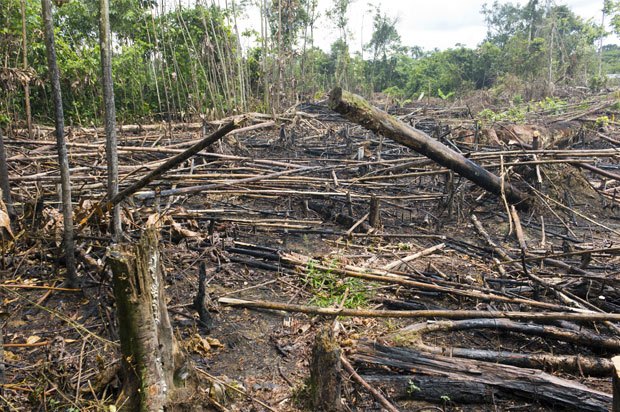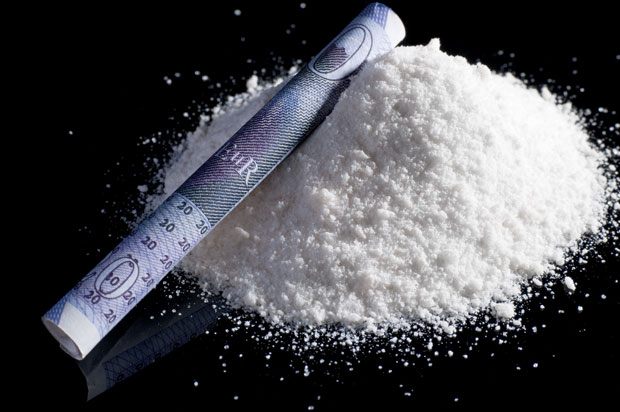What’s wrong with the drugs trade?
The drugs trade is responsible for causing environmental devastation and human rights atrocities all over the world. Sorry to ruin your buzz.

600 million trees are chopped a year to make tobacco
Is taking drugs bad?
Hands up if you do any of the following: use energy-efficient light bulbs, walk/cycle to work, recycle, donate to human rights charities, avoid buying clothes made in child-labour factories, or get all tearful when you watch Oxfam adverts on the telly. Well done. You’re officially a kind, caring, ethical person. But hang on… what’s that in your hand? A cigarette? Oh. And you smoke weed as well? And snort the occasional line at the weekend? Sorry, you can’t have your ethical hash cake and eat it. You’ve probably heard about how drugs harm you, but what about how drugs harm others? Or the planet we live in? The truth is the drugs trade is responsible for some of the most screwed-up human rights awfulness and Mother Earth-raping ever.
Cocaine, human rights, and environmental disasters
Coke is the second most popular drug in this country, but making it and getting it here is a bloody affair. According to author and journalist Anthony Barnett, for every gram of cocaine snorted in the UK, an innocent civilian in Colombia has paid for it with their life. That’s because in recent decades a large proportion of UK’s cocaine supply has originated in Colombia, where civil war rages and competing gangs use coke profits to fund their fighting. Mexico has taken up the baton in bloody drug wars in recent years, and Peru and Bolivia are upping their production, too. A 2003 United Nations report, studying the link between drug trafficking and human rights in Colombia, found cocaine trafficking is linked to the massacre of innocent civilians, selective killings, kidnappings and torture. Not only does coke fund all these nasties, it also generates violence in areas where the coca plant is grown. Land mines and home-made explosives are often planted in areas where local people pass, and anyone unfortunate enough to accidentally get muddled up in the fighting is usually murdered. Jonathan Glennie, who has managed Christian Aid’s aid programme in Colombia, says: “A lot of young people buy fair trade coffee and are aware their lifestyle choices impact others. But when it comes to snorting a quick line of coke they would rather turn a blind eye to the horrible violence and conflict the drug causes.” It’s not just human rights that are sniffed at by drug users. Coke is largely linked with deforestation and contamination of the surrounding habitat. In fact, the United Nations University says that 1g of cocaine requires the destruction of 4sqm of forest, creates an estimated 625g of waste, and 200ml of contaminated water.
Cannabis, the drugs trade, and the environment
But it’s a plant! How can it be bad for the environment? Plants are good things. They gobble up carbon dioxide, photosynthesise, and besides, weed grows naturally as a… err… weed. But that doesn’t necessarily mean passing the dutchie is good for Mother Earth. The illegal growth and cultivation of marijuana is responsible for destroying thousands of acres of forest in the US and natural wildlife habitats. Closer to home, UK cannabis factories have a carbon footprint bigger than a clown’s shoe. Electricity supplies are often bypassed in order to supply enough juice to heat eighty 600W lamps, which make the weed grow quicker. Hello global warming. Cannabis dealers aren’t exactly fussed about humans and their rights, either. UK factories are usually dangerously flammable, putting neighbouring properties (usually full of unsuspecting innocent residents) at risk. And they’re often booby-trapped, endangering fire fighters sent to extinguish them when they do go up. Finally, the money made from growing and selling cannabis isn’t used for community-support grants or sending sick kids to Disneyland. It’s entwined with human trafficking, weapon deals, and money laundering.
Heroin and the Taliban
There are countless reasons why heroin is best avoided, but here are two: It’s addictive as hell, and it funds the Taliban. Opium poppies are a traditional crop in Afghanistan and heroin derived from them accounts for 92% of the world’s supply. So your opium dalliance is funding a group of people who are known for pulling women out of school before they’re eight, cutting off women’s fingers for wearing varnish, and publicly executing them if they break strict Taliban rules.
Laughing gas (nitrous oxide) and the O-zone layer
Funnily enough, the environmental impact of hippy crack isn’t a laughing matter. Nitrous oxide, commonly known as laughing gas, is now the worst human contributor to punching a hole in the ozone layer. Since a ban of CFCs in the nineties, that nice blanket of ozone that protects our fair planet from the sun has been on the mend. But nitrous oxide is undoing that good work. Laughing gas is legal, so you’re not breaking any laws by taking it. Yet its ozone-thinning properties have led some music festivals to ban it.
Tobacco, child labour, and the environment
Ever found yourself lamenting the wrongs of the world while brandishing a cigarette? Well, be prepared to suck up the word ‘hypocrite’ next time you inhale. The tobacco industry has shifted most of its production to developing countries to save money. The real cost? Over 78,000 children in Malawi are working relentlessly for 12 hours a day. They bring home 11p for their efforts. In a 2009 report by charity Plan, the child workers also revealed they suffer physical and sexual abuse while they work, as well as contracting Green Tobacco Sickness. Children as young as five are ingesting tobacco through their skin as they work. In an average day, the nicotine that dissolves into their skin is the equivalent of 50 cigarettes. Tobacco production is also responsible for gigantic amounts of deforestation. In fact, 600 million trees are cut down every year to make tobacco products. The devastation to the environment is twofold. Firstly, huge areas of forest are cleared to grow the plant. Then, more trees need to be cut down and burned to dry out the plant; nine million acres of forest are lost each year as a result.
Photo of forest by Shutterstock
Next Steps
- Release offers free and confidential advice on everything to do with drugs and drugs law. 0845 4500 215
- Addaction helps people recover from drug and alcohol addictions.
- Chat about this subject on our Discussion Boards.
- Need help but confused where to go locally? Download our StepFinder iPhone app to find local support services quickly.
By
Updated on 29-Sep-2015
No featured article












